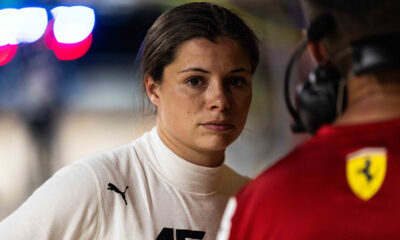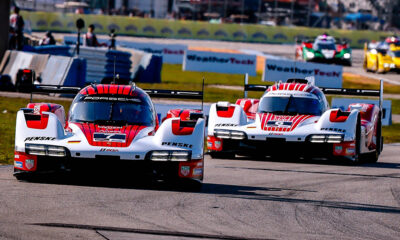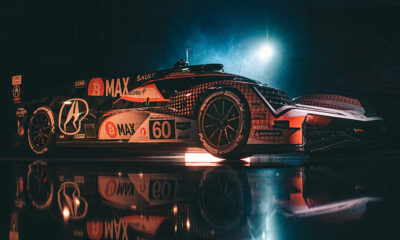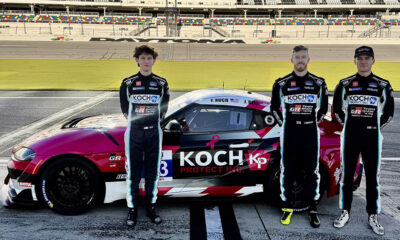
Photo: IMSA
IMSA has already taken a monumental on-track step in sustainable racing with the introduction of North America’s first hybrid-electrified prototypes competing this year in the WeatherTech SportsCar Championship’s GTP class.
That commitment to a greener footprint has extended off the racetrack as well, with the sanctioning body’s at-track business transporter installing solar panels that can power the unit while also providing plug-in Level-2 charging for IMSA’s OEM partners and their vehicles used on site for hot laps, media events, product launches, and official safety vehicles, among other applications.
The Konica Minolta Business Center (KMBC) has been a staple in the IMSA paddock for years. The transporter includes office and business meeting space, with an attached awning offering covered outdoor seating used for hospitality entertainment and informal meeting space.
During the offseason, a flat solar panel system was installed atop the 53-foot transporter trailer. Attached to lightweight lithium batteries located inside the belly of the trailer, the system can power the KMBC for hours on end.
In fact, in its debut at January’s Rolex 24 At Daytona, the solar/battery system powered the KMBC – including its three air conditioning units, lights and other electrical needs – for 36 hours straight with no assistance.
“It’s been a vision at IMSA for three years,” said David Pettit, IMSA senior vice president of marketing and business operations, “but with the GTP class coming to life, timing-wise it made sense to introduce our latest sustainability effort within the IMSA paddock.”
The process began as an effort strictly to provide solar-powered plug-in charging stations for electrified vehicles in the paddock. Pettit saw it as a way to work with IMSA’s lengthy list of automobile manufacturers, allowing them to introduce and showcase electrified passenger vehicles to an IMSA audience that’s 40 percent more likely to purchase an EV.
“As manufacturers go forward on the electrification of their overall fleets, we saw that the hybrid GTP class was a way to transition and bring that further to life for consumers through being able to provide an off-the-grid charging solution for those vehicles,” Pettit explained.
“We can go to our manufacturers and say, ‘Hey, these fans are people that could be ambassadors and early adopters for you, and they have a high consideration to help transition to where we are currently at now to electrification – whatever that may be down the road. Here’s a platform to do that.’”
The charging stations have already proven successful in the most useful of situations. The hybrid BMW XM served as one of the safety cars during the Rolex 24 and two were fully charged at the KMBC plug-in stations during the race.
“So, it had practical application,” Pettit said. “BMW was enthusiastic about how it supported their own sustainability initiatives, so I think the manufacturers are generally excited to bring a car out and know they can say that it was charged off the grid.”
The scope of the project broadened beyond charging stations when Merlin Solar offered to install flat solar panels atop the transporter that can be walked on, eliminating the need to keep unused roof space for IMSA personnel to use when setting up and tearing down the awning and freeing up that space to add more panels.
The change more than tripled the amount of power that can be drawn through the solar panels and into the battery system, allowing for the entire KMBC to go off the grid as well.
And it’s only the beginning. IMSA continues investigating ways for the series, manufacturers and teams to implement more sustainable efforts.
It could include more transporters installing solar panels to reduce the reliance on traditional energy sources or a move toward solar-powered generators instead of gas generators in the paddock or pit lane.
“This is just the tip of the spear,” Pettit said. “We’re exploring other options of sustainability and solutions to help our teams and events. Sustainability is a pillar of IMSA and we will continue implementing newer and better initiatives to continue our position as the leader in ‘Green Racing.’”
























